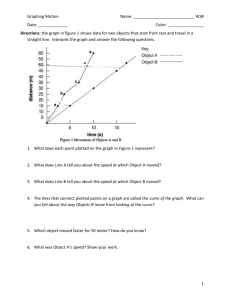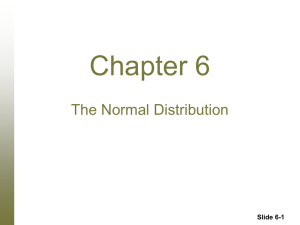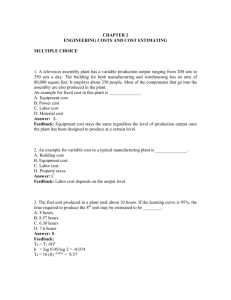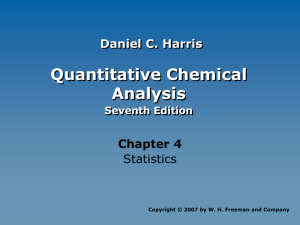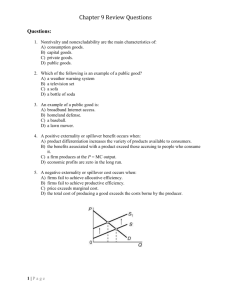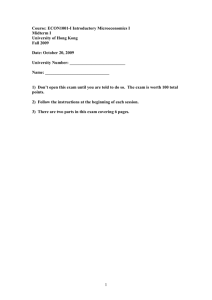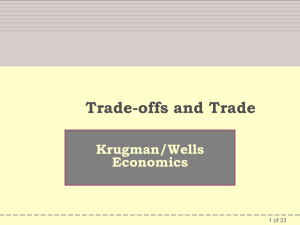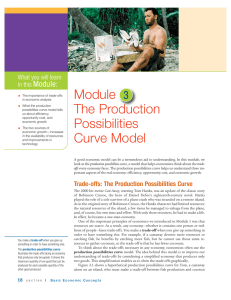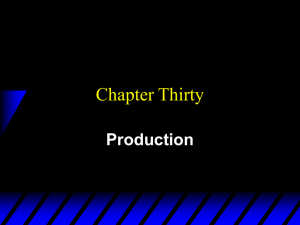Exam 1 Review KEY - Iowa State University
advertisement
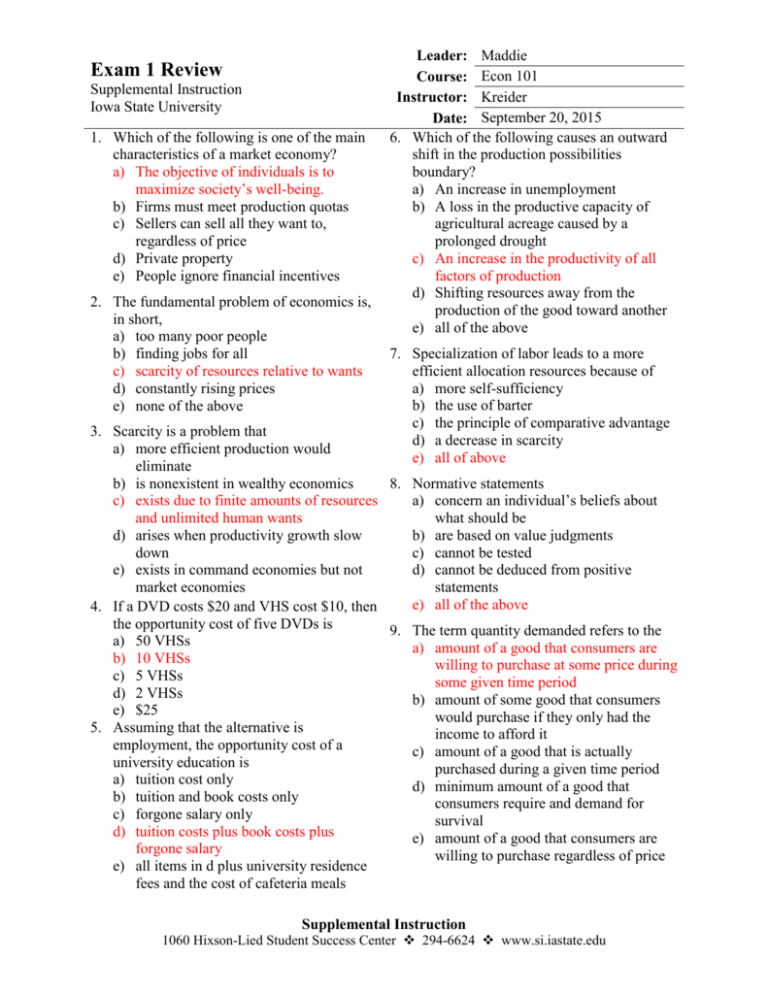
Exam 1 Review Supplemental Instruction Iowa State University 1. Which of the following is one of the main characteristics of a market economy? a) The objective of individuals is to maximize society’s well-being. b) Firms must meet production quotas c) Sellers can sell all they want to, regardless of price d) Private property e) People ignore financial incentives 2. The fundamental problem of economics is, in short, a) too many poor people b) finding jobs for all c) scarcity of resources relative to wants d) constantly rising prices e) none of the above Leader: Maddie Course: Econ 101 Instructor: Kreider Date: September 20, 2015 6. Which of the following causes an outward shift in the production possibilities boundary? a) An increase in unemployment b) A loss in the productive capacity of agricultural acreage caused by a prolonged drought c) An increase in the productivity of all factors of production d) Shifting resources away from the production of the good toward another e) all of the above 7. Specialization of labor leads to a more efficient allocation resources because of a) more self-sufficiency b) the use of barter c) the principle of comparative advantage d) a decrease in scarcity e) all of above 3. Scarcity is a problem that a) more efficient production would eliminate b) is nonexistent in wealthy economics 8. Normative statements c) exists due to finite amounts of resources a) concern an individual’s beliefs about and unlimited human wants what should be d) arises when productivity growth slow b) are based on value judgments down c) cannot be tested e) exists in command economies but not d) cannot be deduced from positive market economies statements e) all of the above 4. If a DVD costs $20 and VHS cost $10, then the opportunity cost of five DVDs is 9. The term quantity demanded refers to the a) 50 VHSs a) amount of a good that consumers are b) 10 VHSs willing to purchase at some price during c) 5 VHSs some given time period d) 2 VHSs b) amount of some good that consumers e) $25 would purchase if they only had the 5. Assuming that the alternative is income to afford it employment, the opportunity cost of a c) amount of a good that is actually university education is purchased during a given time period a) tuition cost only d) minimum amount of a good that b) tuition and book costs only consumers require and demand for c) forgone salary only survival d) tuition costs plus book costs plus e) amount of a good that consumers are forgone salary willing to purchase regardless of price e) all items in d plus university residence fees and the cost of cafeteria meals Supplemental Instruction 1060 Hixson-Lied Student Success Center 294-6624 www.si.iastate.edu 10. Which of the following demonstrates the 16. A country had a/an law of demand? _____________________ in a good when a) Fred buys more gum at $1 each since he it can produce the good with fewer got a $2 raise at work. resources than some other country. b) Sarah buys fewer pencils at $1 each a) Absolute advantage than at $2 each b) Comparative advantage c) Chris buys more Snickers bars at $1 c) Complete advantage each than at $2 each 17. Give the following information answer d) Sally buys fewer Pepsis at $2 each questions below (a-h): since the price of Cokes fell to $1 each 11. An increase in demand means that a) at each price, consumers desire a greater quantity b) consumers’ tastes haven’t necessarily changed c) price has decreased d) all of the above 12. A shift in the supply curve may be caused by any of the following except a) an improvement in technology b) an increase in the wage paid to labor c) an increase in average consumer income d) an increase in the number of firms in the industry e) both b and c are correct 13. The law of supply is: a) The higher the price, the higher the quantity supplied b) The lower the price, the higher the quantity supplied c) The higher the price, the lower the quantity supplied 14. The law of demand is a) The lower the price, the lower the quantity demanded b) The higher the price, the lower the quantity demanded c) The higher the price, the higher the quantity demanded 15. A nation has a comparative advantage in producing some good if a) Its workers have a lower wage than workers in other countries b) It can produce the good with less resources than other countries c) It can produce the good with a lower opportunity cost than other countries Production (in thousands) Coconuts Fish Country T 30 40 Country H 20 10 a) What is the opportunity cost of one fish in Country T? i. ¾ coconut ii. 4 coconuts iii. 4/3 coconuts b) What is the opportunity cost of one fish in Country H? i. ½ coconut ii. 2 coconuts iii. 1 coconut c) Which country has the comparative advantage in fish? i. Country T ii. Country H iii. Neither country d) What is the opportunity cost of one coconut in Country T? i. ¾ fish ii. 4 fish iii. 4/3 fish e) What is the opportunity cost of one coconut in Country H? i. ½ coconut ii. 2 coconuts iii. 1 coconut f) Which country has the comparative advantage in coconuts? i. Country T ii. Country H iii. Neither country g) The country specializing in coconuts would produce how many? i. 20 ii. 30 iii. 40 h) The country specializing in fish would produce how many? i. 40 ii. 30 iii. 20 18. Refer to the graph below to for the following questions (a-d): B C A a) What does this graph represent? i. Supply and Demand ii. Production Possibility Frontier iii. Production Potential Frontier b) Which area of this graph is unfeasible? i. A ii. B iii. C c) Which area of the graph is feasible and efficient? i. A ii. B iii. C d) Which area of the graph is feasible and not efficient? i. A ii. B iii. C 19. Refer to the graph below to answer the following questions (a-e): D B A C a. What does this graph represent? i. Supply and Demand ii. Production Possibility Frontier iii. Neither b. Which of the following represents supply? i. A ii. B iii. C iv. D c. Which of the following represents demand? i. A ii. B iii. C iv. D d. Which of the following represents quantity? i. A ii. B iii. C iv. D e. Which of the following represents price? i. A ii. B iii. C iv. D 20. What affects the supply curve? How does each affect the curve (does it move along or shift the curve)? a) Change in Input Prices (Shift) b) Change in number of firms (Shift) c) Change in Price of good (Movement) d) Change in Technology (Shift) e) Change in Natural Events (Shift) 21. What affects the demand curve? How does each affect the curve (does it move along or shift the curve)? a) Change in Price of good (Movement) b) Change in Price of Substitute or Compliment (Shift) c) Change in Population (shift) d) Change in Income or Wealth (Shift) e) Change in Consumer Tastes (Shift) 22. Which of the following would cause a rightward shift of the demand curve in the market for fresh eggs in St. Louis? a) An increase in the price of powdered eggs, a substitute for fresh eggs b) An increase in the number or firms in the egg-producing industry c) CNN comes out with an article saying that scientists have found that fresh eggs cause lung cancer d) A terrible tornado in St. Louis causes major destruction and causes many consumers to leave the area e) None of the above 23. Which of the following would shift the supply curve for a good leftward? a) A rise in the price of a complement b) A rise in the price of an input used in producing the good One Hour McDonald’s Burger King Burgers 4 5 c) All of the above 24. If there is excess supply of a good, we can generally expect a) The demand curve to shift leftward b) A surplus c) A shortage d) The demand curve to shift rightward 25. If used books are an inferior good, then a decrease in income will cause a a) Rightward shift of the demand curve for used books b) Leftward shift of the demand curve for used books c) Shift in both the demand and supply curves for used books d) Rightward shift in the supply curve for used books Fries 16 15 26. Who has the absolute advantage for making burgers, fries? McDonald’s - Fries & Burger King - Burgers 27. Who has the comparative advantage for each output? McDonald’s – Fries & Burger King - Burgers 28. Match the term with the best answer: Traditional Economy, Command Economy, Market Economy, Capitalism, Socialism, Mixed Economy a) People are largely free to do what they want with the resources at their disposal Market Economy b) A system in which most of the resources are owned by the state Socialism c) Resources are allocated mostly by explicit instructions from some higher authority Command Economy d) A system in which most of the resources are owned by private citizens Capitalism e) Resources are allocated according to the long-lived practices of the past Traditional Economy f) A mixed economic system allows a level of private economic freedom in the use of capital, but also allows for governments to interfere in economic activities in order to achieve social aims. Mixed Economy
